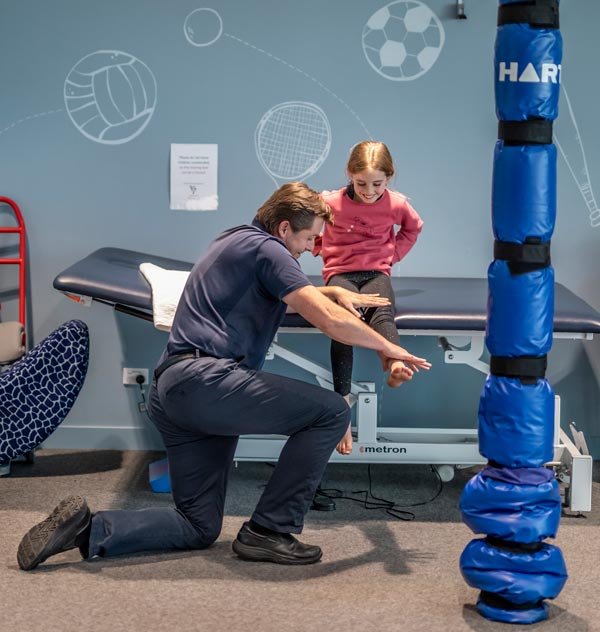The Relevance of Physiotherapy: Exactly How It Plays an Essential Duty in Recovery
Physiotherapy is a critical part of recovery, crucial for bring back physical feature and promoting general health. It employs a multidisciplinary method tailored to private demands, attending to both physical and mental elements of recovery. The duty of physical rehabilitation prolongs past plain pain alleviation; it fosters independence and encourages clients. Recognizing its effect on numerous problems reveals a much deeper significance that necessitates expedition. What lies beneath the surface of this therapeutic method?
Understanding the Duty of Physiotherapy in Recovery
Although many might watch physiotherapy as simply a therapy for injuries, it plays a vital duty in the wider context of recovery. Physiotherapy includes a multidisciplinary method, focusing not only on physical healing however additionally on improving overall well-being. It helps individuals in restoring useful abilities, enhancing wheelchair, and bring back independence complying with surgery, illness, or trauma.Therapists examine each person's distinct needs and create customized treatment strategies, integrating workouts, manual treatment, and education. This tailored method cultivates patient empowerment, urging energetic involvement in their rehabilitation journey. In addition, physiotherapy addresses emotional aspects, providing support that can ease stress and anxiety and advertise motivation.
Advantages of Physiotherapy for Injury Recuperation
Physiotherapy uses considerable benefits for people recuperating from injuries, mostly via effective pain management strategies. These approaches not just reduce discomfort however likewise assist in enhanced flexibility restoration. By resolving both discomfort and activity, physical rehabilitation plays an essential function in the total recovery procedure.
Pain Management Strategies
Effective pain monitoring strategies play an essential duty in the rehabilitation procedure, especially for individuals recovering from injuries. Physiotherapy supplies numerous methods to ease pain, enabling people to engage better in their recuperation. Methods such as manual therapy, including mobilization and adjustment, can minimize pain and enhance cells healing. In addition, techniques like ultrasound and electrical stimulation provide targeted pain alleviation and advertise cells fixing. Exercise treatment, customized to specific demands, strengthens muscular tissues and improves function while likewise attending to discomfort. Education and learning on posture and body auto mechanics further encourages patients to manage discomfort proactively. By including these methods, physical rehabilitation not just minimizes discomfort yet additionally promotes a much more favorable rehab experience, inevitably aiding in the trip towards recuperation.
Improved Mobility Repair
Restoring flexibility is a key objective in the recovery process complying with an injury (physio hamilton). Physiotherapy plays a critical function in this element by using targeted workouts, hands-on therapy, and methods designed to boost movement and feature. Via personalized treatment plans, physiotherapists examine individual limitations and create strategies to conquer them, promoting faster recovery. Techniques such as stretching, reinforcing, and practical training add to regaining variety of activity and security. In addition, physio therapists inform people on body mechanics and pose, which are vital for stopping future injuries. The all natural approach of physical rehabilitation not just help in physical healing however likewise increases confidence, enabling people to go back to their everyday tasks and boost their general quality of life. Enhanced flexibility is a keystone of efficient rehab
Physiotherapy Methods and Techniques
Although different techniques and approaches exist within the domain name of physiotherapy, each is created to resolve certain person needs and problems. Hands-on treatment, for instance, includes hands-on strategies to alleviate discomfort and boost flexibility. This approach includes joint mobilization and soft cells adjustment, targeting muscle mass tension and joint stiffness.Exercise treatment is an additional prevalent technique, concentrating on customized exercise routines to boost strength, versatility, and endurance. This method is often integrated with individual education and learning to advertise self-management and lasting recovery.Additionally, methods such as warm, chilly, ultrasound, and electrical excitement are made use of to minimize inflammation and speed up healing.Lastly, aquatic therapy supplies an one-of-a-kind environment where clients can do exercises with lowered stress on their bodies, improving rehabilitation outcomes. Each of these methods is strategically used, ensuring that the recovery process is both effective and individualized for ideal recuperation.

The Influence of Physiotherapy on Persistent Problems
Physiotherapy plays a crucial function in handling persistent conditions by successfully dealing with discomfort, improving wheelchair, and enhancing general feature. Through customized treatments, individuals can experience a decrease in discomfort and a better capability to do everyday activities. In addition, physiotherapy helps to avoid more issues, adding to long-lasting wellness and well-being.
Taking Care Of Discomfort Efficiently
Chronic discomfort can considerably lessen lifestyle, prompting individuals to seek effective monitoring techniques. Physiotherapy plays an essential duty in easing pain related to different chronic conditions. Via targeted exercises and hands-on treatment methods, physio therapists assist clients enhance their discomfort levels and performance. They employ modalities such as warm, chilly, and electrical stimulation to lower pain and advertise healing. In addition, education and learning on stance and body mechanics allows patients to manage their pain independently. By fostering a far better understanding of their condition, individuals can develop coping systems that improve their total health. Eventually, physiotherapy not only addresses discomfort straight however additionally equips patients to take an energetic duty in their rehabilitation journey, leading to sustainable pain monitoring solutions.
Enhancing Wheelchair and Feature
Managing pain properly is usually a forerunner to boosting mobility and feature in people with chronic problems. Physiotherapy uses targeted exercises and strategies, which can significantly boost joint adaptability, muscle toughness, and total physical capabilities. By concentrating on tailored rehabilitation programs, physiotherapists intend to bring back excellent movement patterns and lower physical restrictions. These treatments not just relieve discomfort but likewise empower patients to restore self-reliance in everyday activities. On top of that, physical rehabilitation addresses the mental aspects of chronic problems, promoting a favorable state of mind that urges energetic involvement in recovery. As people advance with their recovery journey, the advancing impacts of enhanced mobility result in improved top quality of life, allowing them to engage more fully in their personal and social settings.
Preventing More Problems
Several people with persistent problems encounter the risk of further complications, targeted physiotherapy treatments can play a crucial role in minimizing these threats. By concentrating on customized workout programs, physio therapists aid individuals boost toughness, adaptability, and endurance, which are crucial in avoiding secondary problems such as joint pain, muscle atrophy, and reduced wheelchair. Furthermore, Click This Link physiotherapy informs people concerning their problems, empowering them to manage signs efficiently. Normal sessions also advertise adherence to rehab procedures, minimizing the chance of healthcare facility readmissions. Using strategies such as hand-operated therapy, methods, and useful training, physical rehabilitation addresses particular needs, eventually boosting total wellness results. In doing so, it not only help recovery but likewise promotes an aggressive method to long-lasting health for people with chronic conditions.

The Importance of Personalized Therapy Strategies
Just how can customized therapy strategies enhance the performance of physical rehabilitation in rehab? Customizing therapy plans to the private demands of patients significantly boosts results. Each individual provides distinct physiological qualities, case histories, and recovery objectives. Personalized plans take these elements right into account, enabling physiotherapists to make particular interventions that target the underlying concerns much more effectively.By utilizing evaluations that identify the client's strengths and constraints, physiotherapists can develop a roadmap for recuperation. This individualized approach promotes individual interaction, as people feel more spent in their treatment. In addition, personalized strategies can bring about quicker recovery times, decreasing the threat of re-injury or complications.Incorporating comments systems allows recurring changes to the therapy plan, ensuring it stays aligned with the person's development. Ultimately, tailored therapy plans not just boost the efficiency of physical rehabilitation yet likewise promote a holistic strategy to rehab, attending to both physical and emotional elements of recuperation.

Success Stories: Real-Life Effect of Physiotherapy
As people start on their rehab journeys, the transformative impacts of physical rehabilitation typically emerge via engaging success stories. A middle-aged man recovering from a knee replacement found renewed movement and independence via targeted physiotherapy sessions. At first struggling to stroll, he slowly gained back strength and self-confidence, ultimately going back to his favored activities.Similarly, a young professional athlete, sidelined by a serious ankle injury, experienced amazing recovery many thanks to a tailored physical rehabilitation program. With committed support, he not just returned to competitive sports but likewise improved his performance, showing the possibility for physical rehabilitation to surpass initial healing goals.These narratives highlight the profound impact physiotherapy can carry people' lives. They highlight how tailored interventions, assisted by proficient professionals, promote not just physical healing however additionally emotional strength, making it possible for individuals to recover their lives and seek their goals with restored vigor. Such success tales function as powerful affirmations to the value of physiotherapy in rehab.
Often Asked Inquiries
How much time Does a Typical Physiotherapy Session Last?
A normal physical rehabilitation session lasts between 30 to 60 mins. The period often depends on the specific demands of the individual, the intricacy of the therapy strategy, and the kind of therapy being administered.

What Qualifications Should a Physiotherapist Have?
A qualified physio therapist typically holds an appropriate degree in physiotherapy, which includes both theoretical and practical training. In addition, they frequently have licensure or qualification, ensuring adherence to expert requirements and continuous education in their field.
Is Physiotherapy Painful or Uncomfortable?
The question of whether physiotherapy hurts or awkward varies amongst individuals. Some might experience pain during therapy, while others find it beneficial. Ultimately, it relies on personal tolerance and the certain problem being attended to.
Exactly how Commonly Should I Participate In Physiotherapy Procedure?
Identifying the frequency of physiotherapy sessions differs based upon specific requirements, injury intensity, and therapy objectives. Generally, participating in sessions one to three times weekly prevails, however a health care expert ought to direct the choice.
Will My Insurance Policy Cover Physiotherapy Treatments?
Several a knockout post people make inquiries whether their insurance policy will certainly cover physical rehabilitation treatments (physio for kids). Coverage varies considerably by company Resources and plan, so it is recommended for patients to consult their insurance coverage or call their company directly for precise info